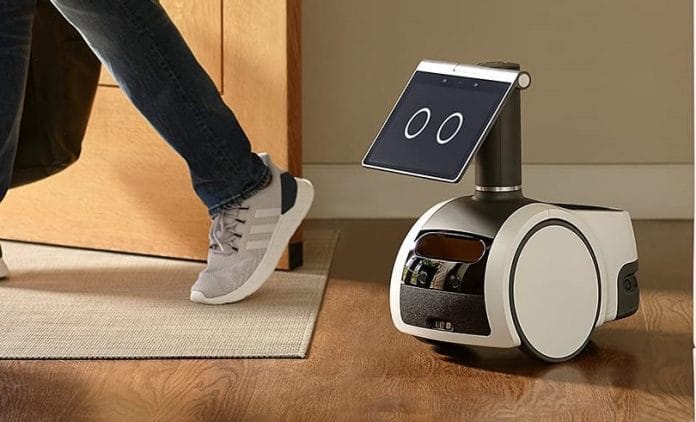Let’s get one thing out of the way about Amazon Inc.’s new miniature home robot. Although the $1,000 Astro will be too expensive for many, it could still find its way into lots of homes once that price falls. Amazon managed to do just that with its Echo and Ring devices, despite initial derision for both, and its combined expertise in industrial robots, home-monitoring systems and natural language processing could make this humble-looking robo-dog one of the world’s first mainstream home robots, the Roomba notwithstanding.
But the cute-looking Astro — first reported by Bloomberg News in 2018 — comes with an array of privacy issues. Chief among them is that, in the long-run, it could contribute to greater public acceptance of AI-powered surveillance. That cultural impact is hard to measure, but seems inevitable given what Amazon is offering. The Astro’s biggest selling point is a camera that rises up like a periscope to about waist-height. As it rolls around the home on three wheels, the robot’s camera uses facial-recognition software to find certain people in the same house. You can tell it, for instance, to take a can of soda to a family member in the living room, and it will use its camera to locate their face and bring it to them.
Software that recognizes faces in this way has proved controversial. Members of Congress have tried to more stringently regulate it or stop police from using it altogether until a national certification process is established. Britain’s privacy regulator is encouraging tighter rules too. Their efforts could be hampered if a puppy-like, face-recognizing surveillance tool in the home becomes widely popular. Most U.S. adults already view facial recognition favorably and support its use by law enforcement, according to a recent survey sponsored by firms which make the technology.
One reason for this permissive view of facial recognition: The term is extremely broad. In today’s public discourse it includes both face verification, which is used to unlock smart phones, and real-time face recognition, which is when security cameras try to spot a certain face in the crowd.
The privacy implications of each are completely different, but people often give sweeping approval to the technology underpinning both without being fully aware of the nuance, according to Stephanie Hare, a U.K.-based privacy researcher focused on facial recognition. Hare says that in her public presentations, her audience often asks why face recognition has such a bad rap when it is so useful and safe for unlocking phones. In such cases, her audience is conflating recognition (controversial) with verification (mostly harmless). “It used to upset me,” she says. “Now I’m like, ‘Ok, this is a teaching moment.’”
It’s hard to see that misinterpretation of the technology going away for a long time, meaning that as more consumers use facial recognition in their home, it will be harder for rule-makers to highlight its potential harms in other areas.
Amazon — which itself has paused its sales of facial-recognition software to police — has tried to imbue the Astro with privacy protecting features. For instance, owners of the device can turn off its camera and mic, and all video and facial-matching is processed on the device; the Astro doesn’t send images up to Amazon’s servers. The company has outlined its efforts to design the robot with privacy in mind in a public white paper.
But other security and privacy questions still hang above the Astro. If someone were to steal the device or hack into its systems, could they access the digital map that the robot creates of someone’s home, or the reams of video footage? Hackers have managed to access Ring cameras in the past including, in one disturbing case, a male stranger who verbally harassed an eight-year-old girl through the Ring camera in her bedroom.
Amazon’s Ring cameras have also fielded more than a dozen court orders and more than 1,600 search warrants in the U.S. in 2020, according to a transparency report that Amazon published in January. If police were to gain access to an Astro through a court order, that could also grant law enforcement far more information than they would ever have hoped to get from an Alexa or Ring device. Amazon could be entering a privacy nightmare with its cute new robot.- Bloomberg
Also read: Bezos is on cover of RSS-linked weekly. He must take note of magazine’s disapproval seriously






